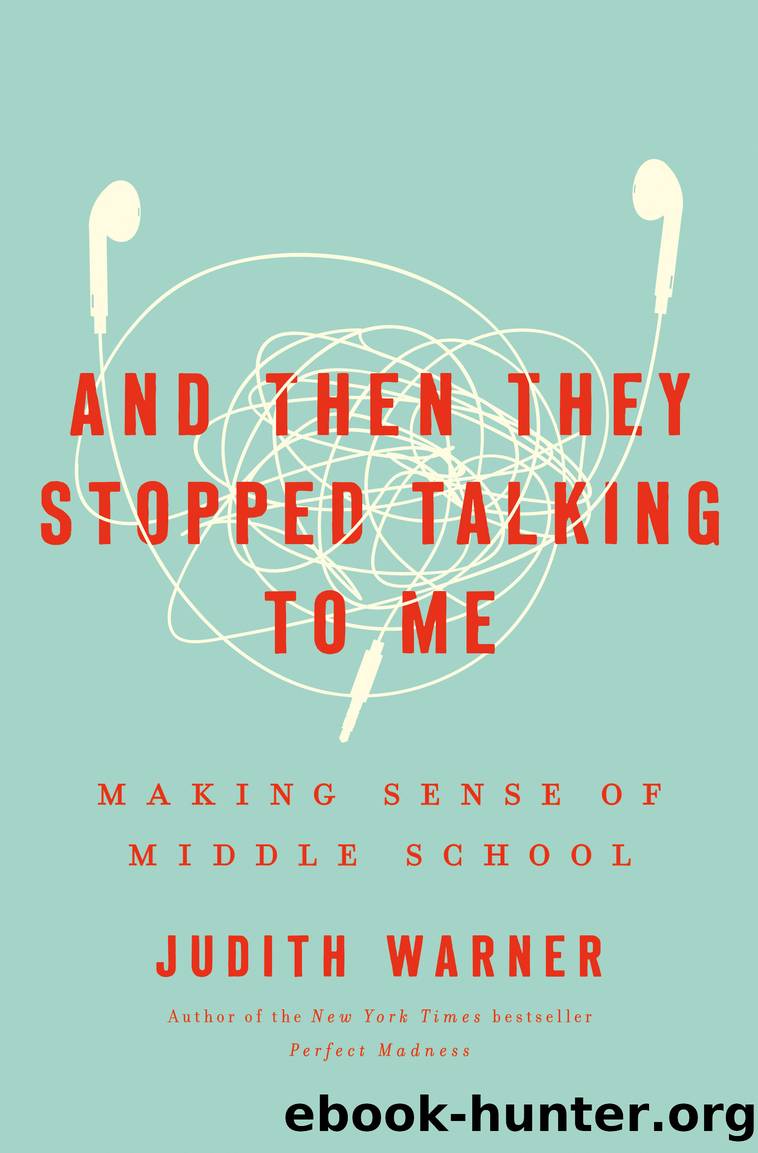And Then They Stopped Talking to Me by Judith Warner

Author:Judith Warner [Warner, Judith]
Language: eng
Format: epub
Publisher: Crown
Published: 2020-05-05T00:00:00+00:00
* * *
—
IF THE EVOLUTIONARY psychologists are right, middle schoolers have a big problem: Everything about their lives is out of whack. Their brains have evolved to set them up for mating at a point when, for any number of reasons having to do with the ways modern human beings actually live, mating is inappropriate. At the most sensitive moment of their lives since infancy, when they’re the most unsure of their place in the world and most in need of solid connection, they’re thrust out of their homey elementary schools and into much bigger, more impersonal, competitive, and organizationally overwhelming institutions, where they change classrooms for every subject (straining those immature executive functioning systems), have far less contact with potentially supportive adults, and have to scramble to form new friend groups. They have parents who are desperate to hold them close and protect them at a point when they are programmed to become more independent. Parents who—going through their own midlife turmoil; mourning the loss of their lovely 10-year-olds; suspiciously eyeing this same new vast expanse of unvetted teachers, kids, and families; and anxiously holding on to whatever semblance of control they can muster—aren’t at their personal best.
There are decades of research now that describe this situation: Anxious and unsettled, frustrated and annoyed, aware of having reached the worst years in their parenting lives, mothers and fathers react with anger when faced with their 12-year-olds’ new critical thinking skills, particularly when those skills are employed to critique them and, most unforgivable of all, their parenting. They find themselves reeling when their carefree children become serious, worried, or merely preoccupied with all the new social, intellectual, and cultural input coming at them. Back in 1994, the child development experts Reed Larson and Maryse Richards lyrically called this switch the “deflation of childhood happiness.” It is entirely normal and developmentally appropriate, Larson and Richards wrote. Nonetheless, they noted, the change can make parents lose their grip on their parenting techniques, coping skills, and basic understanding of who their children are. And, unfortunately, other researchers have noted that when parents are this destabilized, they sometimes blame their kids for how they feel. They tend to handle their feelings of inadequacy and powerlessness by becoming more rigid, controlling, and emotionally explosive. The sad irony being that, in so doing, they bring on the very problems and behaviors that worry and anger them the most.
That basic dynamic—the tragicomedy of middle school parenting—hasn’t gotten any better over the decades. In fact, on the parent side of the equation, things seem to have gotten worse. In 2016, the psychologists Suniya Luthar and Lucia Ciciolla analyzed the results of a wide-ranging survey that asked more than 2,200 college-educated women very detailed questions about how they felt about themselves, their marriages, their other key relationships, and their children. What they found, contrary to popular belief, was that the most unhappy mothers weren’t the ones made sleepless by infants or frantic by fast-moving toddlers. They were the ones who had children in middle school.
Download
This site does not store any files on its server. We only index and link to content provided by other sites. Please contact the content providers to delete copyright contents if any and email us, we'll remove relevant links or contents immediately.
| Administration | Assessment |
| Educational Psychology | Experimental Methods |
| History | Language Experience Approach |
| Philosophy & Social Aspects | Reform & Policy |
| Research |
The Art of Coaching Workbook by Elena Aguilar(48066)
Trainspotting by Irvine Welsh(20056)
Twilight of the Idols With the Antichrist and Ecce Homo by Friedrich Nietzsche(17707)
Fangirl by Rainbow Rowell(7834)
Periodization Training for Sports by Tudor Bompa(7329)
Change Your Questions, Change Your Life by Marilee Adams(6641)
This Is How You Lose Her by Junot Diaz(5774)
Grit by Angela Duckworth(4738)
Red Sparrow by Jason Matthews(4668)
Asking the Right Questions: A Guide to Critical Thinking by M. Neil Browne & Stuart M. Keeley(4576)
Paper Towns by Green John(4169)
Room 212 by Kate Stewart(4107)
Ken Follett - World without end by Ken Follett(3973)
The Sports Rules Book by Human Kinetics(3588)
Housekeeping by Marilynne Robinson(3402)
The Motorcycle Diaries by Ernesto Che Guevara(3333)
Introduction to Kinesiology by Shirl J. Hoffman(3301)
Exercise Technique Manual for Resistance Training by National Strength & Conditioning Association(3292)
Double Down (Diary of a Wimpy Kid Book 11) by Jeff Kinney(3274)
